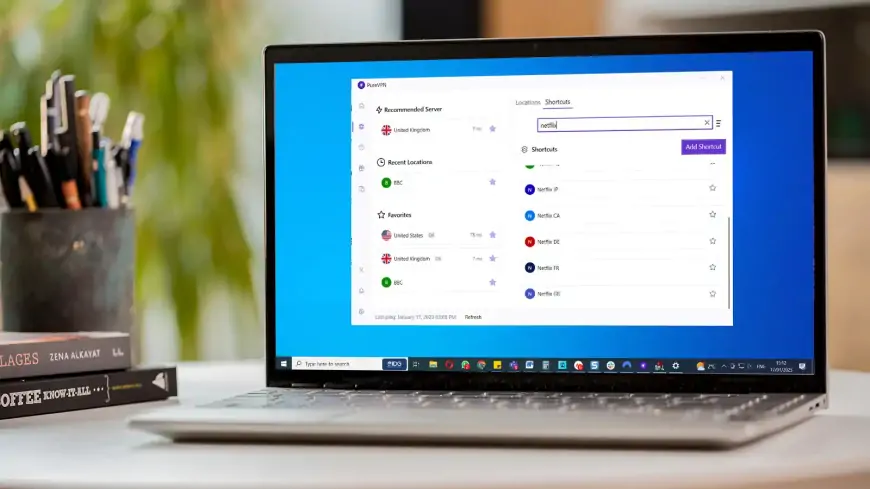PureVPN review: Can you trust this low cost VPN?
Please read the detailed review of PureVPN to discover its features, pricing, security measures, and other aspects.

Our Verdict
Our Verdict
PureVPN boasts 6,500 servers spread across over 70 countries, making it an appealing option for users seeking a VPN with a broad server network. This expansive coverage enhances its ability to unblock content and deliver faster speeds. The Windows application of PureVPN features a user-friendly design that ensures easy navigation.
 Pros
Pros
- Additional features
- Good performance
- Peer-to-peer support
- DNS leak protection
- Extensive server network
 Cons
Cons
- User interface issues
- Controversial logging incident
- Additional charges for advanced features

Pricing
Starts at $3.74/moFree trial
Free for 7 daysKey features
Large network with 6,500 servers; 7-day free trial via mobile; Intuitive applicationHowever, PureVPN has faced criticism due to a logging incident involving the Federal Bureau of Investigation, which has affected its reputation regarding security. Despite efforts to restore confidence, its overall offering might not meet the standards of users prioritizing privacy.
PureVPN offers three subscription plans: Standard, Plus, and Max, each differing in included services:
- PureVPN Standard provides only the VPN service.
- PureVPN Plus includes a password manager and end-to-end file encryption.
- PureVPN Max includes the VPN service, a password manager, end-to-end file encryption, and a personal privacy manager.
Before selecting a plan, I recommend trying PureVPN's 7-day free trial. Although there's no specific desktop trial, you can access it through PureVPN's mobile apps on iOS or Android. After signing up via mobile, you can use the trial on your desktop. During the trial, you can test out all three subscription options (Standard, Plus, Max). Setting up the trial was straightforward in my experience.
For those opting for a paid plan, the two-year PureVPN Standard subscription at $2.29 per month offers the best value, significantly cheaper than the monthly rate of $12.45, which is relatively high.
It would have been preferable if PureVPN had included either the password manager, encrypted file system, or privacy manager in the VPN service itself, rather than requiring an additional subscription. This approach could have distinguished PureVPN with more unique features at no extra cost.
Choosing either the Plus or Max subscriptions allows access to these additional features, but including one in the base VPN service would have provided better value for money.
Is PureVPN secure and reliable?
PureVPN offers robust security protocols including OpenVPN, WireGuard, and IPSec/IKEv2, along with AES 256-encryption, a kill switch, and DNS leak protection—essential features for a modern VPN. However, concerns have been raised regarding its no-logs policy. In 2017, PureVPN allegedly provided logs to the FBI, contradicting its stated policy of not logging browsing activities, connection logs, original IPs, and browsing history.
In response to the incident, PureVPN has undergone two independent audits by Altius IT in 2019 and KPMG in 2021, both confirming that no logs were kept. The KPMG audit, conducted without prior notice, was particularly rigorous. Despite these assurances, the 2017 incident raises doubts about PureVPN's credibility in maintaining user anonymity.
In conclusion, while PureVPN offers strong security features and recent audits support its no-logs claims, potential users may still be cautious due to past controversies. Those prioritizing security may consider exploring alternative VPN services.
How fast is PureVPN?
PureVPN delivers fast speeds and a consistently reliable connection based on my testing. I found that it performed well across various tasks such as using Google Workspace apps (Docs, Drive, Keep), streaming 1080p YouTube videos, conducting web research, and participating in online video meetings. Websites loaded quickly, and I didn't encounter noticeable drops in speed or connectivity.
During internet speed tests, PureVPN demonstrated impressive download speeds with only a 5.98% decrease compared to my ISP. However, there was a notable decrease in upload speed, which dropped by 79.92%, even when using PureVPN's recommended server location. This could be a consideration for users who frequently upload large files.
I also conducted DNS leak tests multiple times using public tools while running PureVPN, and each test showed zero leaks. However, I found that navigating and activating features within the application could feel somewhat sluggish. For instance, accessing the Server Tab and switching servers took a few seconds longer than expected. Once connected, though, PureVPN maintained a stable connection reliably.
PureVPN server network and geographic coverage
PureVPN offers users access to approximately 6,500 servers across more than 88 locations, spanning over 70 countries. This extensive server network is one of the largest available, which is particularly beneficial for users looking to bypass geo-blocked content.
Additionally, PureVPN provides a wide distribution of servers globally.
| Mainland | Bartender |
| Europe | 3,052 servers |
| North America | 2,232 servers |
| Asia | 560 servers |
| Oceania | 483 servers |
| South America | 115 servers |
| Africa | 89 servers |
| South Africa | 4 servers |
Most of PureVPN’s servers are located in Europe and North America, but it's noteworthy that the network offers coverage across all seven continents.
A convenient feature of PureVPN is its automatic segmentation of servers optimized for peer-to-peer file-sharing, simplifying the process for users interested in torrenting. However, I would prefer if PureVPN included more privacy-focused features by default, as its distinct security offerings such as encrypted file-sharing and password manager require additional payment. Despite this, the server network remains a significant advantage.














































